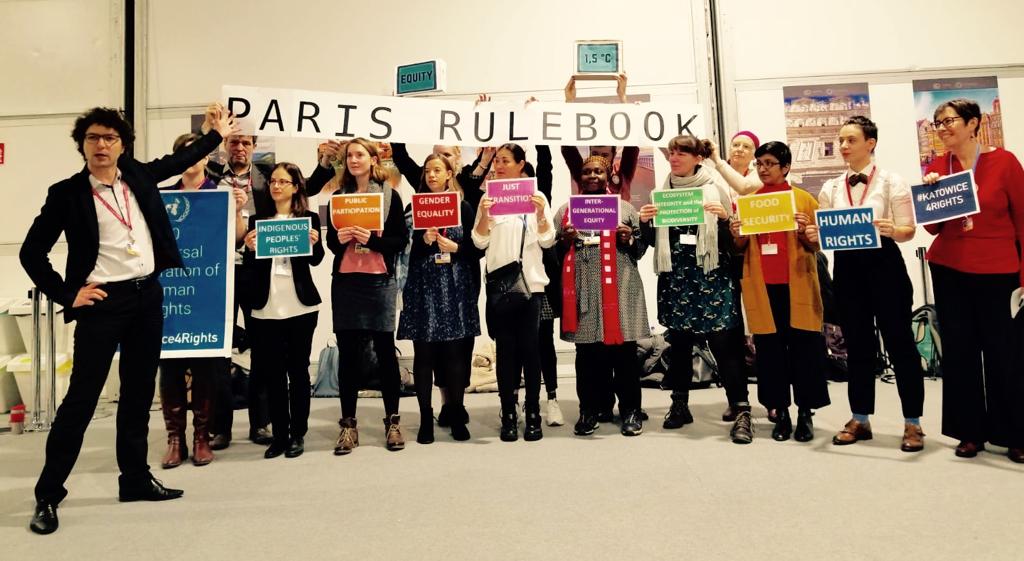
Encouraging and disappointing news unfolding during COP24 on Human Rights International Day
On the day corresponding to the 70th anniversary of the proclamation of the Declaration of Human Rights the second week of the United Nations climate change negotiations will begin at Katowice in Poland (COP24). The negotiators are currently working to define the Paris Rulebook and, that is, the system of rules that will indicate to the Parties of the Paris Agreement how and when action should be undertaken to limit the consequences of climate change and maintain the increase in the average global temperature within 1.5 degrees.
Civil society, represented by all of the special interest groups not linked to governments or private companies, is particularly active in this process. Activists, lawyers, young people, trade-union representatives, religious figures, specialists, human rights defenders and representatives of local and indigenous communities (coordinated in the Human Rights Working Group) are taking steps to ensure the negotiators include in the Paris Rulebook a series of principles related to human rights that will guarantee the effectiveness of climate action.
Although in the international community it is broadly recognised that climate change causes widespread violations of people's rights, resistance on the part of negotiators of some states against the inclusion of these principles within the sphere of climate and environmental issues still appears to be very strong.
During the first week of negotiations, most of the references to human rights in the Rulebook were eliminated but in some cases, these were later reinstated in a restricted or very general form. At the moment references to human rights may be found in the provisions for Nationally Determined Contributions (APA agenda - item 3), in elements of the Adaptation Communication (APA agenda - item 4), in the Modalities, Procedures and Guidelines for the Transparency Framework (APA agenda - item 5) and in the framework of the Promotion of Compliance (APA agenda - item 7). However, such references do not occur in the 'Global Stocktake' process of the revision of agreement commitments (APA agenda - item 6). The 'surviving' references mainly concern women's rights and gender equality, the rights of indigenous peoples and public participation in matters relating to the climate, while references to intergenerational equity, fair transition and human rights, in general, have been lost. It is also worth noting that most of these principles appear in parentheses and are therefore not definitively integrated into the text as no agreement has been reached concerning their inclusion, and it is not clear when they will be reviewed.
Further disappointment regarding this negotiation session is caused by the news that 13 members of civil society, already accredited by the Secretariat to participate in the COP24 meetings, have been denied access to the country. Following a request for clarification, it was stated that it was simply a question of applying the Schengen regulations on potential terrorist threats, however, it remains uncertain whether a reference to these rules is actually necessary given that the subjects involved have no criminal records. Florian Carl, one of the Climate Action Network activists who was stopped on his arrival in Poland, stated that "Repressing the voice of those who defend the environment is unfortunately an international phenomenon that generates strong concerns regarding the defence of human rights and the achievement of climate justice, which are vitally important elements in the fight against the consequences of climate change". The incident also sparked concerns during the negotiations, and it was feared that the trust between countries may be undermined with repercussions on the ongoing consultation and debate.
However, following these negative events at the end of the international human rights day, some good news finally arrived. Work undertaken to implement the Gender Action Plan is rapidly progressing and the platform of indigenous peoples is now finally operational. Until a few years ago such results would have been inconceivable and an encouraging light has begun to shine in the grey coal-mining capital of Poland.
The resolve of society remains unvaried and in the halls and areas where the discussions are carried out, the negotiators are extremely busy, organizing events and other meetings and working tirelessly until late in the evening because the second week of the COP24 has just begun and there is no time to lose.
Chiara Soletti
Published for Italian Climate Network on Gli Stati Generali.
